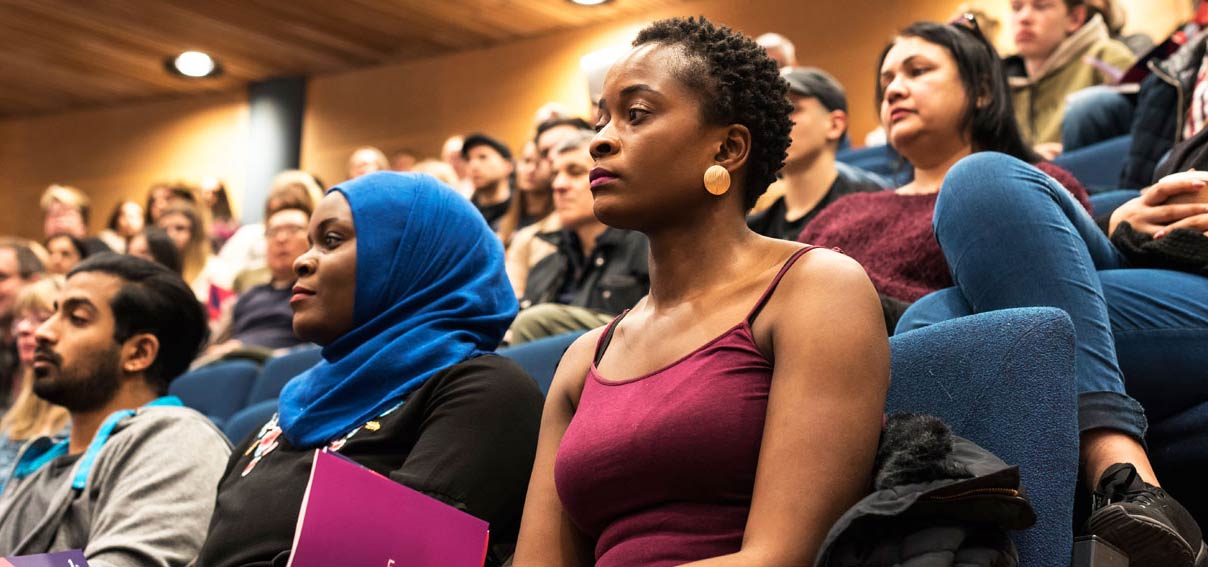
Annual Accounting Conference 2019
Annual Accounting Conference 2019: A conference focusing on how accountants can save the planet
Students in the LSBU Business School are given many opportunities to attend professional events with industry leaders including the annual accounting conference. The annual accounting conference was held on 21 November 2019 in the Business School; it was co-hosted by PQ Magazine. The event brought in many guests from prestigious accounting firms across London, industry experts, sustainability enthusiasts, and students.
The event
In her opening address, Sarah Moore-Williams, Dean of LSBU Business School, gave a brief account of the history of the school. She outlined the Business School ethos and explained its link with sustainability including the thought behind the sustainable aspects of the refurbishment of the former Learning Resource Centre into the Business School building. PQ Magazine Editor, Graham Hambly, then introduced himself and the speakers.
Heading to mass extinction
Professor Jill Atkins, co-author of ‘Chief Value Office: Accountants can save the planet’, presented her keynote address which introduced guests to some worrying facts about our planet; according to experts, we are currently in the 6th period of mass extinction, which is one on from the extinction of the dinosaurs. She noted that we focus too much on blaming just climate change as the cause of this but in fact habitat destruction is more serious, along with over exploitation of resources and the use of pesticides. She also stated that around 1 million different species are threatened currently and 75% of them are insects – including critical pollinators.
Durian fruit: how the supply and demand could lead to extinction of the flying squirrel and investment risks
Professor Jill Atkins drew the link between these phenomena and accountants, as this threat can be linked closely to risk in financial investment. She gave the example of the durian fruit which grows in Malaysia and other South-east Asian countries. This fruit is becoming increasingly popular in China and the demand for it has increased substantially over the last few years which means the financial investors are in a good position, along with the farmers who produce the fruit. This demand meant that farmers in Malaysia had been clearing the forest to plant more durian fruit trees. The number of flying squirrels, which are the sole creatures which aid in pollinating the fruit trees, was dropping as their habitats were being destroyed. This means that, although demand for the fruit is high and investment in farming it seems great, there is a huge risk as, if the flying squirrels are no longer there, there will be no more fruit to meet the demand. If these creatures become extinct, then there is financial risk from the investment in the farms, despite the growth predictions.
Three engaging streams
Following the keynote speech, the sessions were set out in 3 streams: Green Accounting and Social Responsibility, Taxes and Ethics, and Careers and You. In each stream, talks by industry experts were followed by a group panel discussion. The refreshment breaks were great for short networking opportunities before the real (extended) networking drinks session after the event, with academics and industry professionals.
Climate change as a financial risk
For the “Creating a Greener World” stream, Thora Frost, Senior Client Manager at Carbon Trust, stated that only 10% of banks in the UK are taking a long-term strategic approach to managing financial risks from climate change. Phil Fitz-Gerald, FRC’s Director of the Financial Reporting Lab, then led a discussion on identifying best practice in corporate reporting to provide better quality information to investors, and stated that “to create a greener world, the market needs information to make informed decisions”.
Bees: their decline has cost the US $15bn
Led by Jill Atkins and Francesca Sharp, Sustainability Manager at the Institute of Accountants in England and Wales (ICAEW), this stream looked at the role of bees in the climate emergency. The leaders stated that ‘an integrated approach shows that the disappearance of bees could result in disaster for the human race and the eco system generally’. From research, it had been found that the economic value of pollination was $217bn in 2008. However, the impact of bee decline has cost the US $15bn and, if bees do become extinct, it would cost US$90bn to pollinate by hand annually. Francesca Sharp then went on to say that, globally, people under 30 years old will have only one month of below average temperatures in their lifetime and stated that “climate change, or the climate emergency, is an issue that is defining our time. It is referred to by economists as the greatest marketing failure in human history”.
Putting climate change on the balance sheet
The last panel discussion of the conference drew out conclusions on ways in which the accounting profession could help to reduce the impact of climate change, with many speakers claiming that we need to “bring the cost of climate change onto the balance sheet" and Francesca Sharp stating that we need to “start change personally".
Following the event, students and guests had the opportunity to network with the speakers, academics and other professionals in attendance.